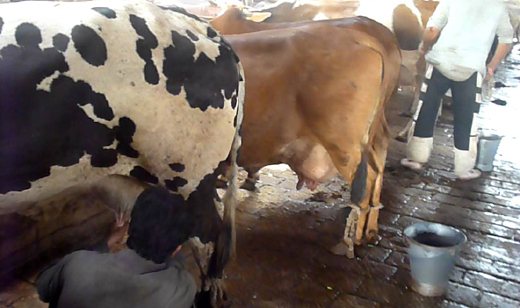
Experts advice DK farmers to nurture desi breeds
Mangalore Today News Network
Mangaluru, Aug 10, 2016: Delivering a talk on the topic ’Recent Trends in Cattle Breeding and Breeding Policies with Reference to the Coastal Karnataka’ at a one-day technical seminar organised by Dakshina Kannada Cooperative Milk Producers Union Ltd, Prof Prem Kumar Uppal, advisor to the Department of Animal Husbandry, Dairying and Fisheries, Punjab, on Tuesday advised cattle rearers in coastal region to take up indigenous breeding of cattle against exotic ones.
 Pr
Pr
Prof. Uppal laid emphasis on rearing of indigenous breeds as they are easier to maintain, disease-resistant, better suited to local environment and survival in adverse conditions, besides producing A2 type of protein in milk, having better emotional bonding with farmers and also low cost inputs.
He said the state should to devise a stipulated breeding policy with a time frame, besides identifying the goals, demarcation of areas for identifying nondescript cattle, taking up census of breed-wise livestock, improving the reproduction capability of indigenous cattle and producing more number of semen doses from elite bulls.
Prof Uppal categorically said that it would be better to set up a mother farm in coastal region where indigenous cattle could be bred and distributed among local organisations.
He cited the example of hi-tech Mother Bull Farm set up at Rauni village near Patiala, Punjab, which is involved in the conservation of indigenous Sahiwal cattle breed. It has been set up at the cost of Rs 60 crore with all mechanised functioning in place, he added.
In the state, such a farm could be set up by strengthening infrastructure like artificial insemination, embryo transfer and cold chain, followed by cattle breeding farms and semen stations among others to name a few, he suggested.
Prof Uppal said the available data puts Karnataka in the third place in the population of indigenous cattle counted at 3.90 million against 2.91 million in exotic and cross bred cattle putting the state in fifth slot. He also made a mention of Malnad Gidda and Amritmahal -the cattle breeds developed in harsh conditions here. He also drew the attention of cattle-rearers towards goat farming which also highly rewarding with eight kg of milk per day.
He said it requires minimum fodder and France has taken it up in a big way. Buffalo could be another option for milk production as Punjab has succeeded in it. Brazil has also cashed in on buffalo rearing, he said.
Breeding impact : Director of the Department of Animal Husbandry and Veterinary Services, Dr Ramachandra Bhat said, "Karnataka is in the forefront in artificial insemination and cross breeding accouting for 65% of cattle production as observed by the Centre. However, the challenges remain to be addressed, as the time has come to select breeds based on quality of milk, especially product specific breeds. Besides, monitoring artificial insemination by setting up a database against manual records, that includes types of semen, results and also blood cells for the benefit of next generation."
Executive Director of Dakshina Kannada Cooperative Milk Producers Union Ltd, Dr B V Satyanarayana said, "The union is progapating HF (Holstein Friesians) and jersey cattle breeds, but the challenges remain as exotic breeds do not adopt to Indian conditions."
Prakash Nadoor, Professor and HoD, Pharmacology, Veterinary College in Shivamogga, delved on judicious use of medicines, as the health of livestock assumes significance in the production of milk..